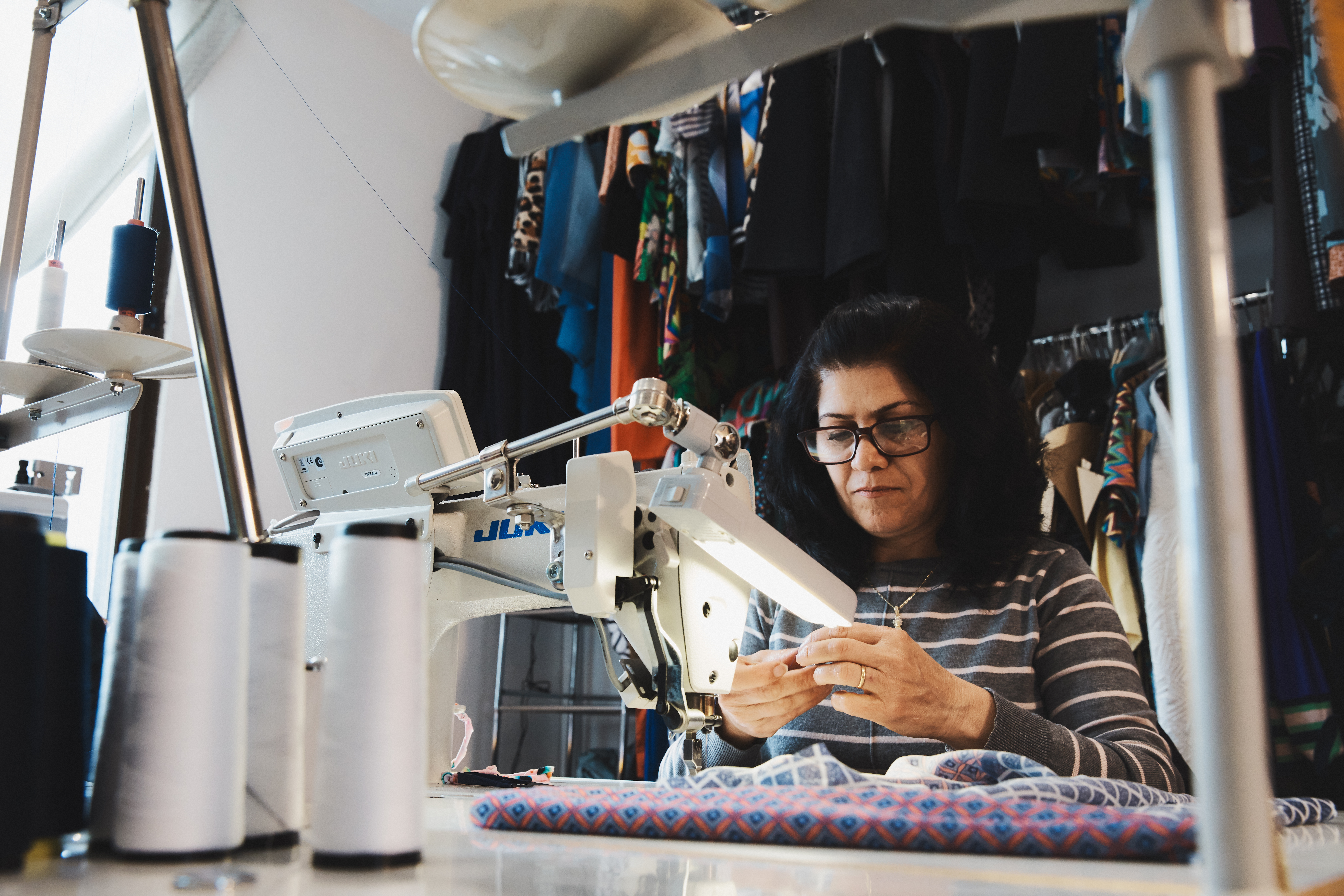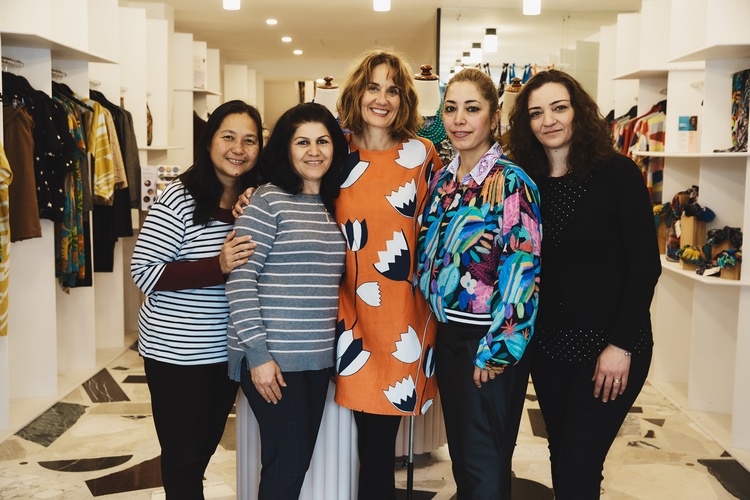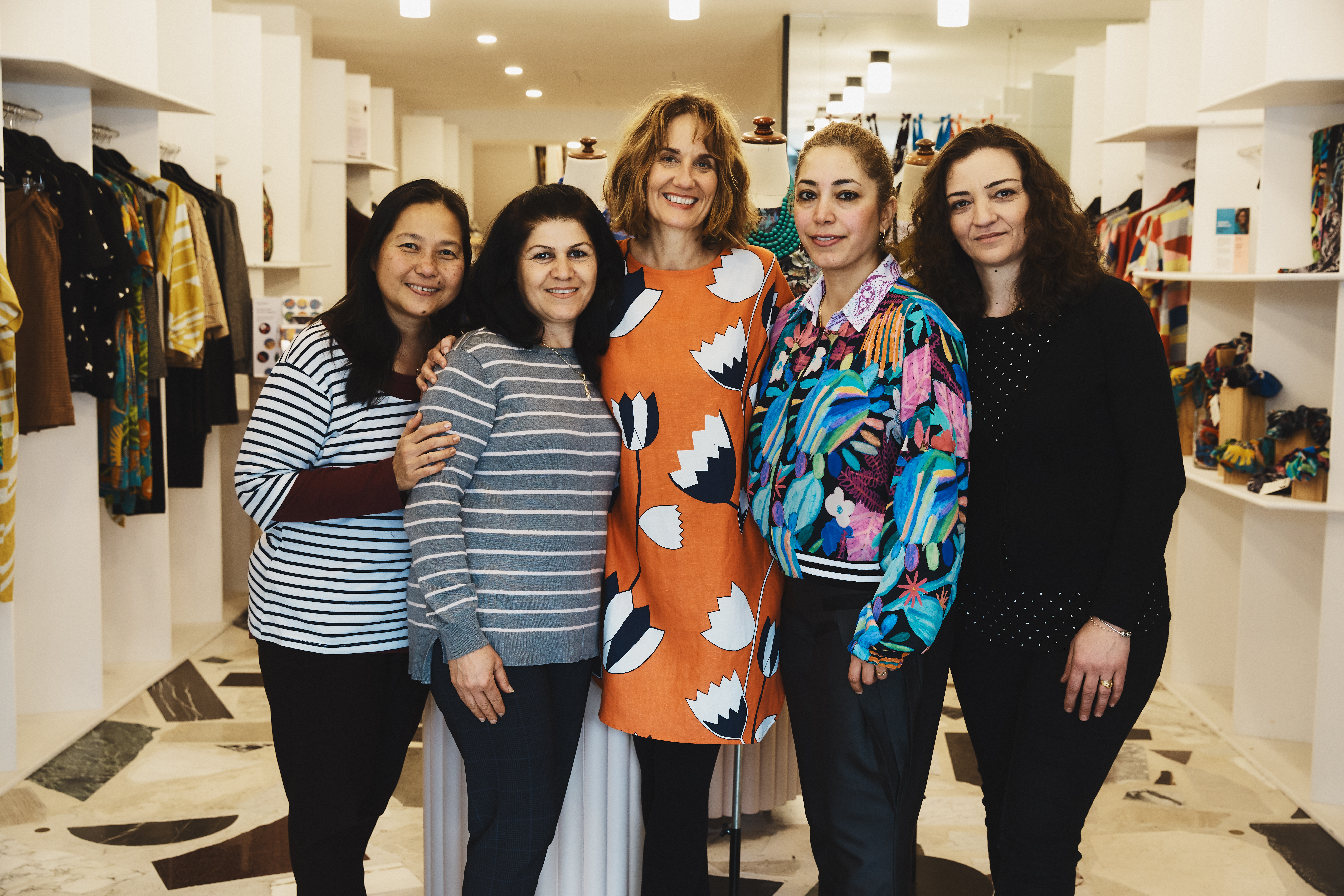Born and raised in Perugia to an Italian father and Swedish mother, she currently lives in Sydney and is the CEO of The Social Outfit, a registered charity and social enterprise that provides employment and training in the fashion industry to people from refugee and new migrant communities in clothing production, retail, design and marketing.
Prior to taking the helm of The Social Outfit in 2019, Schippa travelled the world, working with global leaders in the field of international development and peace.
Her 20-year-career in this area saw her live in Africa, Europe and North America and her CV boasts roles such as director of the Institute for Economics and Peace – which she led for the decade 2008 to 2018 – and chief of the United Nations Office for Partnerships in New York.
Schippa’s inspiring journey began when she was 25 years old and graduated from university in Perugia.
Having grown up in a bilingual household and studied political science and international relations, she had an innate desire to both explore the world and help others.
“I was always very keen on adventure and wanted to do something different from all of my fellow students,” she explains.
“I didn’t want to do my master’s thesis by studying in a library so I opted to go and do fieldwork.
“I spent around a year doing anthropological and ethnological work in Kenya.
“That then landed me my first job in Norway, where I went to study economic development of the Southern African region for around a year.”
Having already made an impact on the global stage, Schippa began aiming higher, specifically for the United Nations.
At just 27 years old, she was selected for a junior position within the secretariat of the UN in New York.
“I ended up spending almost 15 years at the UN,” she says.
“I put it down to a series of lucky coincidences supported by a lot of drive and passion.”
During her time at the UN, Schippa worked her way up the ranks to eventually manage the organisation’s relationships with foundations, philanthropists and the private sector.
At one point, she was responsible for a $1 billion donation that Ted Turner, the founder of CNN, committed to the UN.
“It was at the beginning of philanthropy when no one had heard of a donation that big,” Schippa says.
“It was a very exciting time.”
Then an encounter with an Australian man led Schippa away from the UN and to Sydney.
When Schippa met philanthropist Steve Killelea, she was captivated by his philosophy and ambitions.
“He was incredibly interesting to me because he was the first one to come and talk about peace,” she explains.
“Everyone I had met up until that day wanted to talk about peace but always talked about conflict.
“Think about the medical science: you can study disease and cure disease but it’s not until you start looking at the healthy body that you understand how to actually prevent disease in the first place.
“It’s the same with peace and conflict.”
Killelea pitched the idea of preventing peace rather than resolving conflict to the UN, but at the time it wasn’t successful.
Determined to develop the concept, he essentially head-hunted Schippa and she moved to Australia to help him establish the Global Peace Index (GPI), which measures the relative position of nations’ and regions’ peacefulness.
Following instant success and attention from the media and global leaders, the duo then formed an institute around the GPI, called the Institute for Economics and Peace, which Schippa headed for a decade.
“This was all high-flying, talking with government leaders work, where I learnt a lot,” she says.
When Schippa was approaching her 50th birthday, she decided she wanted to use her invaluable experience in the field to “get her hands dirty” and work directly with those she’d been helping from afar.
“In all my years of international development and peace I’d learnt a couple of things,” she says.
“The first is that investment in women – and especially the employment and empowerment of women – is one of the most impactful investments you can make.
“If you give a woman a job it has a ripple effect on the entire community.
“Women are often unemployed because they’re looking after the family.
“But when a woman works, the money that she earns goes into building that family through health and education etcetera.
“It essentially lifts the whole family out of poverty.
“Also, when girls see their mother going to work it has a generational effect and they too will go on to seek employment.”
The second thing Schippa learnt was that social cohesion is crucial.
“It doesn’t matter how peaceful a place is today, if there’s no social cohesion, there’s a risk of violence at some point in the future,” she explains.
Schippa stumbled upon The Social Outfit – which embodies these two concepts – and applied for the role of CEO, which she has held for two years now.
The Social Outfit runs a clothing retail store, onsite manufacturing and sewing school in Newtown and focuses on supporting refugee and new migrant women and young people to gain vital skills and work experience, develop social connections and feel empowered to transform their lives.
It provides employment opportunities in manufacturing and retailing and offers free training and educational programs, such as sewing classes, which equip people with the skills they need to enter the Australian workforce.

Sewing technician Janette producing a garment in The Social Outfit’s on-site workroom. (Photo supplied)
Since its launch in 2014, more than 400 people from the refugee and new migrant community have participated in The Social Outfit’s employment and training programs, creative projects, fashion shows and events.
For many of the people who pass through The Social Outfit’s doors, it’s their first step to integrating into society and securing long-term employment.
“One woman came to us and she’d never had employment in Australia,” Schippa says.
“She’s a mother of two and she was desperate for an income; often refugees also come from other situations of neglect and abuse.
“She participated in our free sewing classes to increase her skills; then, we employed her for around three months to sew facemasks for us when there was a boom.
“Now she’s been hired full-time, basically for life, by the Australian Navy to make uniforms for them.”
The Social Outfit not only helps women build industry-recognised skills, but also assists with practical matters such as applying for jobs, going for interviews and knowing their rights as employees.
“These women are very capable, they just need a chance and to believe in themselves,” Schippa says.
“The Social Outfit helps build their confidence and skills and makes them feel welcome in Australia.
“Then they go on their journeys to be successful and to contribute to the country.”
Another big part of The Social Outfit is doing creative art projects, where young students are engaged to make signature prints for apparel and accessories.
“The students enjoy something different and learn new techniques,” Schippa says.
“It builds their confidence and pride when they see their artwork on a collection of clothes.”
Aside from the clothing based on these prints, all of The Social Outfit’s garments are made with waste from the fashion industry, adding an environmental element to the charity.
Starting with Carla Zampatti – who’s an ambassador – many designers and labels have contributed to the cause over the years, donating more than 6.5 tonnes of fabric and textile waste that would have otherwise ended up in landfill.
Schippa and her team take any opportunity they can to make a difference and the COVID-19 pandemic was no exception.
When the pandemic hit Australia, The Social Outfit used fabric trimmings that were too small for anything else to make facemasks, which were then sold online under one condition: for every facemask purchased, one was donated to a person in need.
The social enterprise has donated more than 3000 facemasks to date.
During its six years of operation, The Social Outfit has continued to grow at an impressive rate, employing 42 refugees and assisting hundreds more.
Schippa hopes that one day, the initiative will expand to other Australian cities and eventually abroad.
“I’m Italian and I know the challenges Italy faces with migrants; I also know the incredible fashion industry in Italy,” she concludes.
“My dream is to see Social Outfits pop up in places like Milan and France, where they have so much more waste and could do so much more.”












